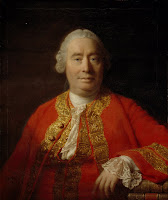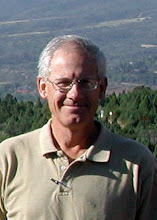Why Do Things Exist
Part 1 of a 3 part series exploring philosophical and religious thought about why problems exist.
The impulse to seek causes is innate in the soul of man -- Leo Tolstoy
Isn’t it interesting to think about how it all got started? When I say “all, I mean “all.” Everything you can imagine -- all the physical things that you can see around you -- all the people you know -- all the subjects, issues, and ideas you’ve heard about --- they all have origins -- origins that often go back to the beginning of humanity or even earlier. There seems to be an infinite depth to everything. For example, I’ve been reading about the beginning’s of the idea of “cause and effect.” It’s hard to imagine, but there was a time when “cause and effect” was not known -- at least not formally.
In this blog article, I will summarize the thoughts of some philosophers and religious people on the subject of cause and effect in general -- that is, why do things exist? If you think about it, everything you see around you has causes -- everything. I’ll take you on a brief journey through our human understanding of these causes -- a journey that started in 350 BC and is, of course, continuing to this time.
In next month’s blog article, I will dig into the subjects of “problems or failures” and share what philosophy and religion have said about these things. I suspect there will be some overlap in this month’s and next month’s thoughts. After all, how can anyone talk about a problem without talking about cause and effect? Interestingly, philosophical thought seems to have made a distinction between non-problematic causes and problematic causes -- and the distinction focuses almost entirely on HUMAN BEINGS.
If necessary, I’ll write a final blog article where I will try to tie the two subjects together, i.e., why do THINGS exist, and then why do PROBLEMS exist.
I’ll be honest with you -- I do not know where this is going. I’m exploring this because I am interested and will report the results of my probing as I go. I reserve the right to come back to this article after I finish the next article to add to, or correct anything I might find as the result of future research. So let’s start.
Why do things exist?
Much of what we think about “cause and effect” has its genesis in Aristotle and his groundbreaking ideas established around 350 BC. As you read the following sentences, please understand that Aristotle was not discussing “why things that go wrong.” He was commenting on the causes of every thing that exists -- shoes, buildings, trees, and even people.
He suggested that the explanation of a thing must answer the following 4 questions:
- What was the “material cause,” i.e., the substance from which a thing was made? For example, the shirt I am wearing was made from cotton. Cotton is the “material cause” of my shirt.
- What was the “formal cause,” i.e., the form or archetype that directs the work? The pattern, or template used to cut my shirt is the “formal cause” of the shirt.
- What was the “efficient cause,” i.e., the primary source of the energy required to take the material and use the template to make the shirt? The people and machines are the “efficient cause” of my shirt.
- What was the “final cause,” i.e., the purpose of the thing in the first place? My shirt provides a covering for my torso to protect it against the elements as well as make me more appealing to the eyes of others. This is the “final cause” of my shirt.
It would be beneficial for you to play with these categories. Think of anything, yourself included, and try to understand each of the types of causes. You’ll find the genius in Aristotle’s thinking as you explore these categories.
Aristotle’s groundbreaking ideas about causation were the foundation of almost all human thought on the subject for over 1500 years. Then, as the age of The Enlightenment began, some complementary ideas emerged.
Thomas Aquinas (1200’s) built on Aristotle’s ideas by suggesting an order to the above 4 types of causes: 1) final; 2) efficient; 3) material; and 4) formal. In other words, first he says comes the purpose, followed by the energy, directed at the material, according to the plan. Again, it would be beneficial for you to play with Aquinas’ order for you to see the brilliance of his suggestion.
But as other philosophers began to dissect Aristotle’s and Aquinas’ conclusions, the ideas surround “causation” started to get murky.
Francis Bacon (1500’s), for example, said “physics handles the material and efficient causes, and metaphysics handles the formal and final causes (at least in nature). Note that metaphysics is “that branch of philosophy that deals with the first principles of things, including abstract concepts such as being, knowing, substance, cause, identity, time, and space.” Bacon declared that the study of “final causes” were inappropriate to the study of physics, because the answers to these things are unknowable and, therefore, ought to be beyond the scope of human probing.
Other philosophers could not help see the connection between causation and religion -- especially when one considers the issue of “final cause.” According to many of them, final causes in nature seemed to imply that every natural thing is governed by an indwelling form or template that is working toward a definite end, and that the whole of nature exhibits the working out of a divine plan. In fact, Aquinas’ ordering of Aristotle’s 4 types directly points to the existence of an unknowable but almost certain divine purpose and plan.
Baruch Spinoza (1600’s), for one, vigorously rejected the link between final causes and a divine plan. He said that “nature has no set end before itself and that all final causes are nothing but human fictions.” In fact, Spinoza was disgusted in those that will “not cease from asking the causes of causes until at last you fly to the will of God, the refuge of ignorance.”
It is understandable that a clash emerged between religious and scientific thinking in those days, since the main driving force of the Age of Enlightenment was a backlash against an autocratic church that controlled almost all aspects of life. However, isn’t it interesting that the battle between secular and religious thought has lasted until the present?
David Hume (1700’s) was one who started pointing to the futility of knowing true causation, and suggested that we “are ignorant of the manner in which bodies operate on each other -- their force and energy is entirely incomprehensible to us.” In essence, Hume suggested that we do not know WHY there is such a thing as cause and effect, and that all we CAN know is that it exists. It was Hume who gave us the idea of the cause of the cause of the cause -- a never ending series of dominos -- a journey back in time. Why does the iceberg exist? It came from a glacier. Why did the glacier exist? Snow accumulated over a long period of time. Where did the snow come from? Atmospheric conditions. Why were there atmospheric conditions? That’s the way our world works. Why? A never ending series of questions that eventually are unanswerable.
In reviewing this article, it is most astounding to me that Aristotle’s original categorization of causation that was posed almost 2,400 years ago is still valid today. Future philosophical and religious thinking argued about the value of exploring the more intangible aspects of “formal and final causes,” and about the religious implications of Aristotle's and Aquinas’ suggestions --but not about his 4 types of causes.
What is even more astounding is that the debate about these issues continues to this day.
In the next blog, I will share the results of my research of philosophy and religion on the subject of “problems and failures” -- undesirable phenomena that occur ON (or to) the things we have been discussing in this article. It should be interesting.






